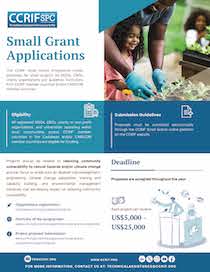Grand Cayman, Cayman Islands, December 9, 2020. CCRIF has made payouts totalling US$30.6 million to the Government of Nicaragua following the passage of Tropical Cyclones Iota and Eta, which made landfall as Category 4 hurricanes along the Nicaraguan coast within two weeks of each other in November. Both hurricanes resulted in landslides and flooding, displacing thousands, with Nicaragua’s National Disaster Prevention System (SINAPRED) reporting that at least 16 persons died and many are still missing. CCRIF expresses sympathy to all those who have lost loved ones and knows that these payouts, whilst important to help with addressing immediate needs and closing the protection gap, will never be able to compensate for the injuries and loss of life.
The events of the 2020 Hurricane Season and their impacts on Central American countries are very much reminiscent of the 2017 Atlantic Hurricane season which battered many Caribbean countries resulting in the Caribbean Community (CARICOM) declaring action to make the Caribbean the first climate-resilient region in the world. According to CCRIF CEO, Mr. Isaac Anthony, “We would like to play our part in creating an environment for greater levels of South-South cooperation between the Caribbean and Central America as they confront similar natural hazards and have similar vulnerabilities. We are committed through our upcoming strategic planning sessions in 2021 to create strategies and activities beyond those focused on financial protection that would help to bring these two regions together to share best practices, lessons learned and experiences in disaster risk management and climate change adaptation that would help to advance the sustainability agendas of both regions”.
These payouts mean that, to date, CCRIF has made a total of 48 payouts to 14 of its member governments, totalling approximately US$194 million – all within 14 days of the event. CCRIF’s payouts may be relatively small compared to the overall cost of rebuilding but their value is in providing quick liquidity to governments immediately following a natural disaster, allowing them to address the most immediate needs. Based on assessments undertaken by CCRIF, more than 65 per cent of members’ payouts have been used by governments to address the needs of their most vulnerable citizens for food, water, medication and shelter following a natural disaster.
Hurricane Iota was the last hurricane in the record-breaking 2020 Atlantic Hurricane Season, which was the most active Atlantic hurricane season on record in terms of the number of tropical cyclones – recording 30 named storms, 13 hurricanes, and 6 major hurricanes. Indeed, this is the first time in recorded history that two Category 4 hurricanes have affected the same location within two weeks.
About CCRIF SPC:
CCRIF SPC is a segregated portfolio company, owned, operated and registered in the Caribbean. It limits the financial impact of catastrophic hurricanes, earthquakes and excess rainfall events to Caribbean and Central American governments by quickly providing short-term liquidity when a parametric insurance policy is triggered. It is the world’s first regional fund utilising parametric insurance, giving member governments the unique opportunity to purchase earthquake, hurricane and excess rainfall catastrophe coverage with lowest-possible pricing. CCRIF was developed under the technical leadership of the World Bank and with a grant from the Government of Japan. It was capitalized through contributions to a Multi-Donor Trust Fund (MDTF) by the Government of Canada, the European Union, the World Bank, the governments of the UK and France, the Caribbean Development Bank and the governments of Ireland and Bermuda, as well as through membership fees paid by participating governments. In 2014, a second MDTF was established by the World Bank to support the development of CCRIF SPC’s new products for current and potential members and facilitate the entry of Central American countries and additional Caribbean countries. The MDTF currently channels funds from various donors, including: Canada, through Global Affairs Canada; the United States, through the Department of the Treasury; the European Union, through the European Commission, and Germany, through the Federal Ministry for Economic Cooperation and Development and KfW. Additional financing has been provided by the Caribbean Development Bank, with resources provided by Mexico; the Government of Ireland; and the European Union through its Regional Resilience Building Facility managed by the Global Facility for Disaster Reduction and Recovery (GFDRR) and The World Bank.
English





